
Paul Carrack: “If I get a title, I can flesh it out, but to get something that hasn’t been done eight million times already is pretty tricky.” Photo: Andrea Hunnisett
The Ace, Squeeze, Mike And The Mechanics, and solo, singer-songwriter with the ‘golden voice’ demystifies his approach to writing songs
Trofiled in a recent BBC documentary as “The Man With The Golden Voice”, Paul Carrack is a highly regarded singer and songwriter who has enjoyed a long and illustrious recording career as both a solo artist and pivotal member of successful rock and pop groups, including Mike And The Mechanics, Roxy Music, Squeeze and Roger Waters’ backing band. Meanwhile, working as a touring and session musician across the past four decades, Paul steadily built a reputation as vocalist-keyboard player of choice for everyone from The Pretenders to The Smiths, and still continues to fulfil this role for Eric Clapton.
Carrack initially rose to prominence in the 70s as the frontman and principal songwriter of Ace, when their best-known song How Long? became a UK hit single and reached the Top 10 in the US and Canada. His success continued through the 80s and 90s as lead singer and co-songwriter for Mike And The Mechanics, penning Over My Shoulder with Mike Rutherford, which became one of the band’s biggest radio hits.
Maintaining an active solo career to this day, Paul Carrack has released a string of assured albums, containing such landmark songs as Satisfy My Soul and Eyes Of Blue, as well as collaborating with the likes of Nick Lowe (I Live On A Battlefield) and the Eagles’ (Love Will Keep Us Alive and I Don’t Want To Hear Any More). Carrack’s songs have also been recorded by artists such as Diana Ross, Tom Jones, Michael McDonald and Jools Holland.
Even as he moves into his autumn years, Carrack’s tireless work ethic and prolific output means he’s just brought out his 17th solo album, barely a year since the last LP release, and he’s back on the road just a few months after the completion of his most successful tour to date.
We’re curious to know what drives the singer to keep relentlessly writing songs and performing live. How does Paul find the time to fit it all in? Luckily, Songwriting gets a small gap in his schedule to ask this, and other questions, in a corridor at the BBC’s Maida Vale studios in London. He’s between rehearsals for a Radio 2 programme commemorating the JFK assassination, where he’ll go on to perform a song by Paul Simon. Like the American songwriter he’s covering, we learn that Carrack is a self-confessed ‘re-writer’ but is incredibly modest about his songwriting skills. “It’s not rocket science as far as I’m concerned,” he’ll say. We agree… it’s far more complicated than that!
How did you go from playing keyboards to writing songs?
“I started off playing in bands at school, playing covers, then in my teens it was soul music – that’s my favourite type of music really. Then it all went a bit progressive, so that’s when we started making up bits of music. I wouldn’t call them songs, but we got the idea of putting instrumentals together. Then, when we formed the band Ace – which was originally just to play in pubs for fun – we were slightly different to the other pub rock bands in that we did write songs. One of the very first songs I wrote was How Long?”
That was a pretty good start!
“Yeah it wasn’t bad. I wish I’d had a few more good ideas like that!”
Can you remember how the song came about?
“Yeah, I remember it very well. It is a real song about a real situation, although it’s disguised somewhat. Ace was struggling, playing in the pubs around London, and another band called Sutherland Brothers & Quiver were doing rather better than us – they had a record deal, tours of the States supporting Elton John and things like that. They were our mates and ‘borrowed’ our bass player for a few gigs as a stand-in, but then they tried to steal him!”
So it wasn’t about a woman?
“No, but everyone thought it was. Most of my songs are straight forward, but on the other hand they’re quite ambiguous in that they could fit a number of situations.”
Do you keep it ambiguous on purpose?
“It’s kind of the way they come about. The problem is I’ve never been super-confident about my songwriting. I find music, melodies and shapes pretty easy, but lyrically I’m a bit ‘moon in June’ and it used to worry me because I grew up in the shadow of Nick Lowe, Chris Difford and Elvis Costello. When I was in Squeeze, they were my peers and I was embarrassed about my stuff because I didn’t have any edge. So I’ve always been a bit insecure about lyrics. I’m not a big reader either, I don’t read much and a friend of mine always said, ‘Words in, words out.’ My stuff is pretty straight-forward and borderline cliché!”
You’ve worked with a lot of great songwriters over the years. Any one of those you’ve learned from, in particular?
“I’ve learnt from them all in some way, but I really think Nick Lowe is a greatly underrated songwriter. He’s a great innovator, and I’d say he’s more of a concept writer – he has an idea and it’s saying something. I’m credited with having co-written Battlefield with Nick, but I didn’t really have much to do with it to be honest – I think I just made the tea and put a few chords in!
What do you find comes first? Do you tend to get the lyrics out the way first, or do you get the music down and put off the lyrics until the last minute?
“It’s usually a musical thing with me – I’ll just jam away and start singing, freeforming off the top of my head, and then I’m stuck with that idea and have to make something out of it. I hardly ever write the lyrics first, but I’ve started putting down titles which I’ve found to be a great help. If I get a title, I can flesh it out, but to get something that hasn’t been done eight million times already is pretty tricky these days!”
So would you say you’re not a ‘rewriter’? Do you try and get that moment of inspiration and then run with it from there?
“I am a re-writer, but usually I’m stuck with a title once I’ve sung it, because nothing else ever sounds as good. When I wrote I Don’t Want To Hear Anymore for the Eagles, the chorus melody was the first thing that came into my head, for some reason. I thought they were never going to record a song with a name like that – you can just imagine the radio DJ playing it and saying, ‘No, I don’t want to hear anymore!’ So I tried different lines but they just didn’t work as well. I don’t know why, but sometimes the lyrics and melody just marry up in a way that’s difficult to change. ‘Demo-itis’ we call it sometimes. So I just fit the rest of the song around that.”

Photo: Andrea Hunnisett
Do you tend to jam with the guitar or keyboard?
It can be either, it depends what’s available.
How about with a song like Eyes Of Blue, did that start on the piano?
“Yes, but that’s unusual for me – I don’t usually pick out a topline on the piano. I know other writers do that, like Burt Bacharach for example. Don’t get me wrong, I’m not putting myself in the same breath, but his stuff is a bloody nightmare for singers; it’s all intervals that you don’t sing naturally.”
Where do you like to make music? Do you find a little space at home, or do you write on tour?
“I usually write in my little studio at home, when it’s time to do an album. On tour I’m just thinking about the gig, but I’ve started to put down ideas on my phone, which is quite handy. When I started my latest album, having done 10 months on the road, I thought I didn’t have any songs at all, and I’d have to make it a covers album. But I quickly wrote five songs and a lot of them came from little bits and pieces on my phone.”
You’ve been pretty successful as a songwriter. What keeps you going? Is it the same thing now as it was 20 or 30 years ago?
“I think I’ve still got something in there that I want to do, and I think I can do better than everything I’ve already done. I don’t get the feeling I’m going downhill, I think I’m gradually getting a little bit better… it’s just taking ages! I’m 62 years old and I’m aware that I could start going off the boil anytime soon, but I still hope to do something even better, for my legacy, or for my own satisfaction more than anything. I don’t feel a tremendous urge to write, but I like to sing – it’s a great form of expression. If I stopped touring, I probably wouldn’t write that much.”
So, when you finish each tour, do you think ‘What am I going to do next?’ and start work on the next album?
“Well, to be honest, after 10 months on my own tour and then four months with Clapton in his band, I was knackered, so I thought there was no way I’d make an album! But Peter Van Hooke [co-producer on Rain Or Shine], who I’ve known for years, came round and bullied me into doing it. Plus, I was booked up until May next year already, so it would be ages before I had another record out, and I wanted to keep producing stuff.
“Because I’d been on the round for 10 months and singing away, my voice was in pretty good nick. Normally, when I come off the road, I’ll take a nice little break and my voice would get soft, but I was in the mode of cracking on. Although you’re knackered, you just get on with it when you’re on tour, you press on, and I carried that into the album.”
Do you know what you’re up to next?
“I’m on tour with my band now, I go to Japan with Clapton in February, then come back with my own band in March and April… I can’t think beyond that. I might get run over by a bus!”



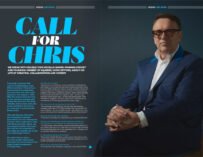

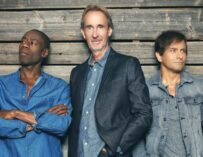
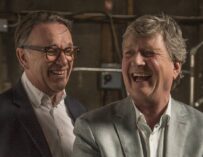

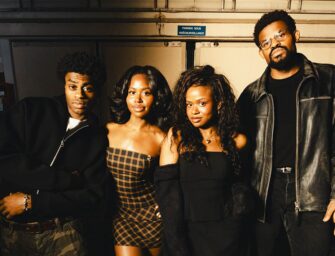


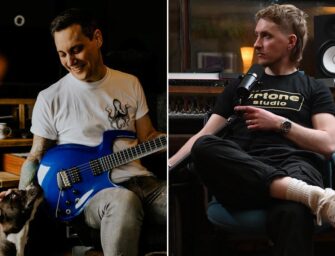























I always enjoyed his tasty style.”The Beggar on a beach of Gold “Mike and the Mechanics is great and love Blue Views.